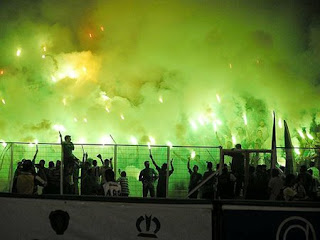
Football hooliganism refers to unruly and destructive behaviour such as brawls, vandalism, and intimidation carried out by Association football club supporters and fans.[1] Fights between supporters of rival teams may take place before or after football matches at pre-arranged locations away from stadiums, in order to avoid arrests by the police, or they can erupt spontaneously at the stadium or in the surrounding streets. A football firm (also known as a hooligan firm) is a gang formed to fight with members supporters from other clubs. While some firms, especially in southern and eastern Europe, have been linked with far right politics or racism, other firms have been associated with leftist or anti-racist views. The firms' political views are not representative of all supporters of the teams.
The violent activity ranges from shouts and fistfights to riots in which opposing firms clash with bats, throw bottles or rocks, or even use knives and guns.[2] In some cases, stadium brawls have caused fans to flee in panic, and fans have been killed when fences or walls have collapsed.[3] In the most extreme cases, firm members, police, and bystanders have been killed in the violence, and riot police have intervened with tear gas, armoured vehicles and water cannons.[4]
Football hooliganism has been depicted in films such as I.D., The Firm, The Football Factory and Green Street (the last featuring fictional firms based on West Ham's' Inter City Firm (ICF) and Millwall's Bushwackers). There are also many books about hooliganism, such as The Football Factory (also a film) and Among the Thugs. Some critics argue that these media representations glamorise violence and the hooligan lifestyle. In the 1970s and early 1980s, the casual culture transformed the British football hooliganism scene. Instead of wearing working class skinhead-style clothes, which readily identified firm members to the police, gang members began wearing designer clothes and expensive offhand sportswear and were known as casuals.

+copy.jpg)




